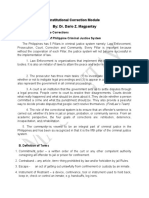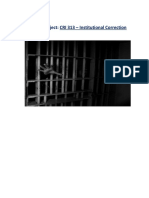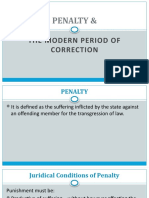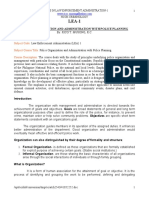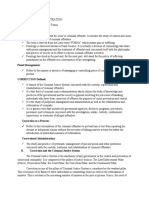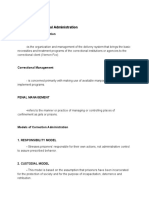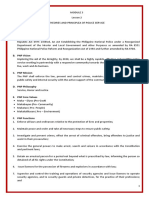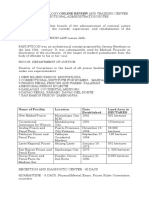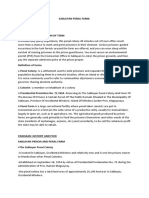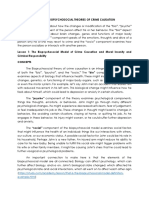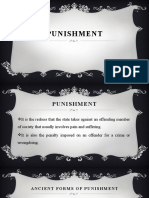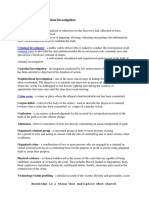Professional Documents
Culture Documents
3 - Early Codes
3 - Early Codes
Uploaded by
Jovie Masongsong0 ratings0% found this document useful (0 votes)
4K views9 pagesThe document discusses early legal codes from various ancient civilizations. It describes the Code of Hammurabi from ancient Babylon, considered the oldest known legal code. It also discusses the Justinian Code and Twelve Tables from ancient Rome, as well as the Code of Draco from ancient Greece. The document then briefly mentions the Burgundian Code from 500 AD that specified punishments according to social class. Finally, it provides context about early codes in the Philippine setting, such as the Code of Kalantiao and Maragtas Code.
Original Description:
Copyright
© © All Rights Reserved
Available Formats
PPTX, PDF, TXT or read online from Scribd
Share this document
Did you find this document useful?
Is this content inappropriate?
Report this DocumentThe document discusses early legal codes from various ancient civilizations. It describes the Code of Hammurabi from ancient Babylon, considered the oldest known legal code. It also discusses the Justinian Code and Twelve Tables from ancient Rome, as well as the Code of Draco from ancient Greece. The document then briefly mentions the Burgundian Code from 500 AD that specified punishments according to social class. Finally, it provides context about early codes in the Philippine setting, such as the Code of Kalantiao and Maragtas Code.
Copyright:
© All Rights Reserved
Available Formats
Download as PPTX, PDF, TXT or read online from Scribd
Download as pptx, pdf, or txt
0 ratings0% found this document useful (0 votes)
4K views9 pages3 - Early Codes
3 - Early Codes
Uploaded by
Jovie MasongsongThe document discusses early legal codes from various ancient civilizations. It describes the Code of Hammurabi from ancient Babylon, considered the oldest known legal code. It also discusses the Justinian Code and Twelve Tables from ancient Rome, as well as the Code of Draco from ancient Greece. The document then briefly mentions the Burgundian Code from 500 AD that specified punishments according to social class. Finally, it provides context about early codes in the Philippine setting, such as the Code of Kalantiao and Maragtas Code.
Copyright:
© All Rights Reserved
Available Formats
Download as PPTX, PDF, TXT or read online from Scribd
Download as pptx, pdf, or txt
You are on page 1of 9
Early Codes
• Babylonian and Sumerian Codes
• Roman and Greek Codes
• The Burgundian Code
1. Babylonian and Sumerian Codes
a. Code of King Hammurabi (Hammurabic
Code) – Babylon, about 1990 BC, this was
credited as the oldest code prescribing
savage punishment, but in fact, Sumerian
codes were nearly one hundred years older.
2. Roman and Greek Codes
a. Justinian Code– 6th C A.D. , Emperor Justinian
of Rome wrote his code of law. An effort to match a
desirable amount of punishment to all possible
crimes. However, the law did not survive due to the
fall of the Roman Empire but left a foundation of
Western legal codes.
The Twelve Tables (XII Tabulae), (451-450 BC) –
This represented the earliest codification of
Roman law incorporated into the Justinian Code.
It is the foundation of all public and private law
of the Romans until the time of Justinian. It is
also a collection of legal principles engraved on
metal tablets and set up on the forum.
b. Greek Code of Draco – In Greece, the Code
of Draco, a harsh code that provides the same
punishment for both citizens and the slaves as
it incorporates primitive concepts (Vengeance,
Blood Feuds). The Greeks were the first society
to allow any citizen to prosecute the offender in
the name of the injured party.
3. The Burgundian Code (500 A.D) – This
has specified punishment according to the
social class of offenders, dividing them into:
nobles, middle class and lower class and
specifying the value of the life of each person
according to social status.
Early Codes (Philippine Setting)
Eventually, the Spanish Civil Code became effective in the
Philippines on December 7, 1889, the “Conquistadores” and the
“Kodigo Penal” (The Revised Penal Code today, 1930) was introduced
by the Spaniards promulgated by the King of Spain. Basically, these
laws adopted the Roman Law principles (Coquia, Principles of Roman
Law, 1996).
Mostly tribal traditions, customs and practices influenced laws during
the Pre-Spanish Philippines. There were also laws that were written
which include:
a. The Code of Kalantiao (promulgated in
1433) – the most extensive and severe law
that prescribes harsh punishment.
b. The Maragtas Code (by Datu Sumakwel)
c. Sikatuna Law
You might also like
- 5 - BJMP Duties and ResponsibilitiesDocument15 pages5 - BJMP Duties and ResponsibilitiesJovie Masongsong67% (3)
- Special Crime Lecture-LECTUREDocument59 pagesSpecial Crime Lecture-LECTUREJovie MasongsongNoch keine Bewertungen
- Crime Detection Review QuestionsDocument11 pagesCrime Detection Review QuestionsJovie MasongsongNoch keine Bewertungen
- Notes On Criminal InvestigationsDocument20 pagesNotes On Criminal InvestigationsJovie Masongsong100% (1)
- Lesson 1 Institutional Correction ModuleDocument4 pagesLesson 1 Institutional Correction ModuleNik Yap78% (9)
- Chapter 7 - Pre-Colonial and Spanish Regimes, Transfer of The Bilibid Prison To Muntinlupa, TheDocument5 pagesChapter 7 - Pre-Colonial and Spanish Regimes, Transfer of The Bilibid Prison To Muntinlupa, Thekim ryan uchiNoch keine Bewertungen
- Institutional Corrections ReviewerDocument24 pagesInstitutional Corrections ReviewerJonah Tolentino0% (1)
- Chapter 3 Modern PenologyDocument4 pagesChapter 3 Modern PenologyJee Almanzor100% (1)
- Ca 1 - Institutional Corrections: History of Correction, The Nature and Trends of PunishmentDocument52 pagesCa 1 - Institutional Corrections: History of Correction, The Nature and Trends of PunishmentJayson ampatuan100% (1)
- Institutional CorrectionDocument358 pagesInstitutional Correctionpatrick100% (1)
- Institutional Corrections Part 1Document9 pagesInstitutional Corrections Part 1vworldpeace yanibNoch keine Bewertungen
- The PioneersDocument3 pagesThe PioneersBernabe Fuentes Jr.100% (1)
- Introduction On Insitutional CorrectionDocument8 pagesIntroduction On Insitutional Correctionvworldpeace yanib100% (1)
- MidtermDocument11 pagesMidtermJovie MasongsongNoch keine Bewertungen
- CA 101 NotesDocument8 pagesCA 101 NotesJohnpatrick DejesusNoch keine Bewertungen
- 2 - Penalty and The Modern Period of CorrectionDocument8 pages2 - Penalty and The Modern Period of CorrectionJovie Masongsong100% (1)
- CRIM 201 Module by Sherwin DimasuhidDocument29 pagesCRIM 201 Module by Sherwin DimasuhidRonalyn PaunalNoch keine Bewertungen
- Lea 201 Unit IiiDocument4 pagesLea 201 Unit IiiRonalyn PaunalNoch keine Bewertungen
- Lesson 1: Introduction To Corrections: 2 Types of CorrectionDocument13 pagesLesson 1: Introduction To Corrections: 2 Types of CorrectionRimwel GarafilNoch keine Bewertungen
- Diversification and Classification of Inmates As To Entitlement of PrivilegeDocument19 pagesDiversification and Classification of Inmates As To Entitlement of PrivilegeAngel Pedroso100% (1)
- Rule Xiv Reception Procedures, Classification Board, Disciplinary Board and Punishable Acts of InmatesDocument9 pagesRule Xiv Reception Procedures, Classification Board, Disciplinary Board and Punishable Acts of InmatesEmmanuel BuanNoch keine Bewertungen
- Institutional Correction NotesDocument16 pagesInstitutional Correction NotesLhAdz DodOng Toledo Jr.67% (3)
- Lea 4Document32 pagesLea 4Janille HermosaNoch keine Bewertungen
- Ca 3 Lesson 2 Golden Era of PenologyDocument6 pagesCa 3 Lesson 2 Golden Era of PenologyChristian IlaganNoch keine Bewertungen
- Non-Operational National PrisonsDocument2 pagesNon-Operational National PrisonsSintas Ng Sapatos0% (2)
- Introduction To Criminology (25 Personalities in Criminology) - PALMARES, CRISTINA MAE R. BSC-1BDocument9 pagesIntroduction To Criminology (25 Personalities in Criminology) - PALMARES, CRISTINA MAE R. BSC-1BCristina Mae R. PalmaresNoch keine Bewertungen
- Non Institutional Correction ReviewDocument80 pagesNon Institutional Correction ReviewNickel ElerNoch keine Bewertungen
- Crim 4 ModuleDocument55 pagesCrim 4 Moduleaya brea antalanNoch keine Bewertungen
- Lea 2 Interpol PresentationDocument18 pagesLea 2 Interpol PresentationZefren Botilla100% (1)
- Lea 1 PDFDocument41 pagesLea 1 PDFHybro Ratunil II100% (1)
- Institutional CorrectionDocument9 pagesInstitutional CorrectionJoshua D None-None100% (1)
- Types of PatrolDocument17 pagesTypes of PatrolJoebell VillanuevaNoch keine Bewertungen
- 4 - PrisonDocument18 pages4 - PrisonJovie Masongsong100% (1)
- Ca 1 - Institutional CorrectionsDocument16 pagesCa 1 - Institutional CorrectionsJayson ampatuan100% (1)
- Law Enforcement Organization and AdministrationDocument10 pagesLaw Enforcement Organization and AdministrationNheil Patrick PunongbayanNoch keine Bewertungen
- annotated-BUREAU OF CORRECTIONSDocument6 pagesannotated-BUREAU OF CORRECTIONSNowelynRoseQuiazonNoch keine Bewertungen
- Correctional Administration 1: I. Basic Definition of Terms: PENOLOGY DefinedDocument21 pagesCorrectional Administration 1: I. Basic Definition of Terms: PENOLOGY DefinedTinTinNoch keine Bewertungen
- Reception and Diagnostic Center (RDC) : Lesson 3: Admission and Confinement of InmatesDocument3 pagesReception and Diagnostic Center (RDC) : Lesson 3: Admission and Confinement of InmatesChristian IlaganNoch keine Bewertungen
- Correctional AdministrationDocument6 pagesCorrectional AdministrationWency EspañolNoch keine Bewertungen
- CORR 211 ReportDocument13 pagesCORR 211 ReportReina Allyza PinedaNoch keine Bewertungen
- Correctional Institution For WomenDocument2 pagesCorrectional Institution For WomenSintas Ng Sapatos100% (1)
- Tools of Criminal InvestigationDocument14 pagesTools of Criminal Investigationlian carla c. luzong100% (2)
- Module 3 Lea 1 PDFDocument18 pagesModule 3 Lea 1 PDFjerick gasconNoch keine Bewertungen
- GMA - FRONT ROW DocumentariesDocument9 pagesGMA - FRONT ROW DocumentariesArvin CastañedaNoch keine Bewertungen
- CLJ 1 - PCJSDocument26 pagesCLJ 1 - PCJSSay DoradoNoch keine Bewertungen
- The New BJMPDocument1 pageThe New BJMPLloyl Yosores MonteroNoch keine Bewertungen
- CDI 1 - ModuleDocument31 pagesCDI 1 - ModuleMagr EscaNoch keine Bewertungen
- Lesson 2 and 3Document29 pagesLesson 2 and 3CloieRjNoch keine Bewertungen
- CORRECTIONSDocument9 pagesCORRECTIONSGinger SomarNoch keine Bewertungen
- Manuscript - Sablayan Prison and Penal FarmDocument11 pagesManuscript - Sablayan Prison and Penal FarmJohn Vincent BauerNoch keine Bewertungen
- Crim 501 Correctional Administration TerminologiesDocument18 pagesCrim 501 Correctional Administration TerminologiesLorie GilbuenaNoch keine Bewertungen
- History of PhotogDocument4 pagesHistory of PhotogZac GarciaNoch keine Bewertungen
- Correctional Administration MidtermDocument7 pagesCorrectional Administration MidtermJerine Alba PuebloNoch keine Bewertungen
- Industrial Security Management (LEA3)Document33 pagesIndustrial Security Management (LEA3)Sevilla JoenardNoch keine Bewertungen
- 1 - Golden Age of PenologyDocument12 pages1 - Golden Age of PenologyJovie MasongsongNoch keine Bewertungen
- Philippine Correctional SystemDocument36 pagesPhilippine Correctional Systemdezza joy suan50% (2)
- Module 7: Stating The Biopsychosocial Theories of Crime CausationDocument13 pagesModule 7: Stating The Biopsychosocial Theories of Crime CausationNADAL NICA JOY L.100% (1)
- Chapter 1 and 2 Questioner of Character InformationDocument9 pagesChapter 1 and 2 Questioner of Character InformationMark Joseph P. Gania100% (3)
- Comparative Police SystemDocument21 pagesComparative Police SystemYra RemetirNoch keine Bewertungen
- CDI 1 Unit 6Document9 pagesCDI 1 Unit 6Stefanio Estal100% (1)
- The Filipino P Olicemen: Foundation of Police EthicsDocument35 pagesThe Filipino P Olicemen: Foundation of Police EthicsAdriel Marasigan100% (1)
- CA 1.2 Institutional CorrectionDocument11 pagesCA 1.2 Institutional CorrectionMerryandjence LebanonNoch keine Bewertungen
- Module 1 Complete Pres-1Document48 pagesModule 1 Complete Pres-1mart09211991Noch keine Bewertungen
- Notes in CorrectionDocument44 pagesNotes in CorrectionBan CarantoNoch keine Bewertungen
- 1 - Golden Age of PenologyDocument12 pages1 - Golden Age of PenologyJovie MasongsongNoch keine Bewertungen
- 6 - Classification of PrisonersDocument15 pages6 - Classification of PrisonersJovie Masongsong100% (1)
- 2 - Penalty and The Modern Period of CorrectionDocument8 pages2 - Penalty and The Modern Period of CorrectionJovie Masongsong100% (1)
- 5 - PunishmentDocument17 pages5 - PunishmentJovie MasongsongNoch keine Bewertungen
- 4 - PrisonDocument18 pages4 - PrisonJovie Masongsong100% (1)
- 4 - BJMPDocument15 pages4 - BJMPJovie MasongsongNoch keine Bewertungen
- 2 - Criminological and Penological TheoriesDocument19 pages2 - Criminological and Penological TheoriesJovie MasongsongNoch keine Bewertungen
- 4 - PrisonDocument18 pages4 - PrisonJovie MasongsongNoch keine Bewertungen
- 5 - PunishmentDocument17 pages5 - PunishmentJovie MasongsongNoch keine Bewertungen
- Final Coaching Drills ENGLISHDocument36 pagesFinal Coaching Drills ENGLISHJovie MasongsongNoch keine Bewertungen
- 2 - Criminological and Penological TheoriesDocument19 pages2 - Criminological and Penological TheoriesJovie MasongsongNoch keine Bewertungen
- Final CoachingDocument119 pagesFinal CoachingJovie Masongsong100% (1)
- Cseaug18 - Comprehensive - Math - Answer KeyDocument4 pagesCseaug18 - Comprehensive - Math - Answer KeyJovie MasongsongNoch keine Bewertungen
- Cseaug18 - Comprehensive - Englis - Answer KeyDocument8 pagesCseaug18 - Comprehensive - Englis - Answer KeyJovie MasongsongNoch keine Bewertungen
- Fire Micz Crim Review PDFDocument101 pagesFire Micz Crim Review PDFJovie MasongsongNoch keine Bewertungen
- Special Crime InvestigationDocument128 pagesSpecial Crime InvestigationJovie Masongsong100% (1)
- Fundamentals of Criminal InvestigationDocument6 pagesFundamentals of Criminal InvestigationJovie Masongsong100% (1)
- Drug Education and Vice ControlDocument7 pagesDrug Education and Vice ControlJovie MasongsongNoch keine Bewertungen




